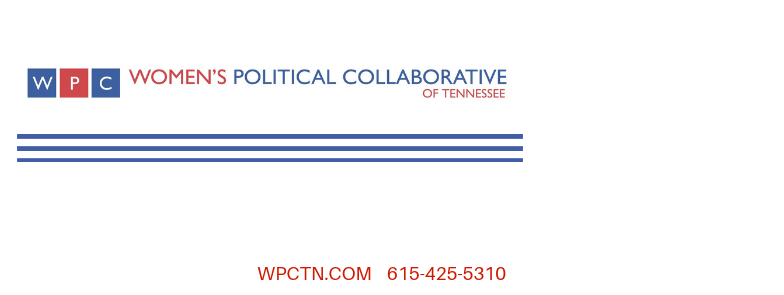2013 Legislative Session Summary
By Anne Carr, WPC Lobbyist, and Christi Granstaff, VP for Legislation
The first legislative session of the 108th General Assembly ended on April 19, the earliest adjournment since at least 1995. Both the House and Senate had set that end date as their goal, having achieved a relatively early May 1 adjournment last year.
Although, as usual, there was a final flurry of legislative activity, by and large the bills endorsed by the WPC were approved and those opposed either died or were put on the shelf for potential consideration in 2014. The second and final session for the 108th begins next year on the second Tuesday in January. All legislation that remains pending this year may be taken up in 2014.
TANF Bill Likely to Spur 2014 Debate
SB132/HB261, which penalized the TANF (Tennessee Aid to Needy Families) grants of needy families, was ultimately sent back to the Senate Health Committee from the Senate floor. A firestorm of opposition and media attention resulted in unapologetic remarks from the Senate sponsor, Sen. Stacey Campfield, of Knoxville, although he attempted to clarify that his intent was simply to get parents more involved in the education of their children. Sen. Campfield himself made the motion to return the bill to committee, where both the Health and the Education Committees are expected to confer on the subject, after a number of fellow Republicans announced on the Senate floor that they would not support the bill.
The House bill met a similar fate more quietly. It was sponsored by Rep. Vance Dennis and had survived a near defeat in the House Health Committee before moving on to the House floor. The bills must both be re-approved by the committees in order to move forward next year, but the sponsors are expected to offer additional amendatory ideas.
Other Bills Opposed by WPC
SB632/HB984, known simply as the “ultrasound bill,” was taken off notice by the sponsors, Sen. Jim Tracy and Rep. Rick Womick, after a reported split in groups that would typically have supported such a bill. Proponents of SJR127, which will be on the 2014 ballot for public vote, were said to believe that publicity about the bill could negatively impact their arguments for the passage of the resolution.
This bill, which will also remain pending in 2014, requires all women prior to abortion to have a “trans-abdominal” (as opposed to vaginal) ultrasound, which must occur between 72 and 24 hours prior to an abortion. It also mandates a specific script for the health care provider, as well as that the patient be required to listen to a heartbeat, if it is audible.
SB1267/HB1128, by Sen. Nicely and Rep. Timothy Hill, would have changed the standard of proof needed for an order of protection to “clear and convincing evidence,” a nearly impossible standard to meet. It was withdrawn early on during the session by Rep. Hill and will not be pending in 2014.
Anti-Human Trafficking Bills Pass
A number of bills aimed at deterring human trafficking and aiding in prosecution for such offenses were approved during the legislative session. All were actively supported by WPC.
Rep. Jim Coley, of Memphis, has been the champion of this important issue for several years and was sponsor of many of the bills in the package of legislation. Sen. Brian Kelsey, also of Memphis, has become a key Senate sponsor, as has Sen. Doug Overbey, of Maryville. Representatives Mary Littleton, Dawn Moody, and Gerald McCormick have also been primary sponsors of some of the House bills. Senator Charlotte Burks and Rep. Sherry Jones also introduced an independent bill seeking coordination of services for victims, which, unfortunately, did not pass but seemed to raise many questions about how the services are best offered.
There were 14 pieces of legislation in the package put together by Rep. Coley and his staffer Stephanie Peterson, who coordinated the handling of the bills. The subject matter ranged from beefing up the law on what acts are considered human trafficking, which brings enhanced penalties, to easing the termination of parental rights, if a parent is involved in trafficking a child under 18. Other bills dealt with restitution for victims, the seizure of assets of perpetrators, and removing a statute of limitations on the prosecution of crimes committed against children. Most of the legislation passed, although it was more challenging for those that came with a built in cost to state government.
Two bills with fiscal notes, SB446/129, by Sen. Overbey and Rep. Coley, and SB1029/HB416, by Sen. Kelsey and Rep. McCormick, were approved, and WPC member activity undoubtedly helped make that happen. The former expands the offense of solicitation of a minor to include trafficking for commercial sex acts, patronizing prostitution, promoting prostitution, aggravated sexual exploitation of a minor. The latter adds a number of offenses to the definition of criminal gang offenses.
Human Trafficking Commission Established
The only bill with a cost that did not make it was SB447/HB131, also by Overbey and Coley, which would have established a Class A felony for “criminal gang members” committing trafficking for commercial sex acts. It would have also eliminated the commonly used defense that the victim of the offense is a minor and consented and would have created a “sexual offense” for purposes of the sex offender registry for patronizing the prostitution of a minor.
This important bill is pending in 2014 and is likely to be endorsed by a newly configured Human Trafficking Commission named by Governor Haslam. Members will include the TBI Director, the Commissioners of Human Services, Childrens’ Services, and Safety, and representatives of agencies that specialize in serving to educate the public and provide services to trafficking victims.
The Commission will take a systematic look at the current situation with human trafficking and make recommendations on how the state of Tennessee can best bring its resources to bear to diminish this terrible crime.
WPC Members Come Through
Thanks to all of you who made the effort to be involved in these and other issues during this 2013 session! Whether you made calls or wrote emails or attended the Women’s Day on the Hill, this activity and support is critical to our lobbying efforts.
Please don’t hesitate to contact us if you have questions about these or other legislative issues!

